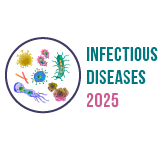3rd International Conference on
Infectious Diseases
November 06-07, 2025 | London, UK

Address: Building A, Bath Road, Heathrow Boulevard, Sipson, West Drayton, UB7 0DU, United Kingdom
Infectious Diseases 2025

Pennsylvania State University, USA
Abstract:
Infection with the helminth Schistosoma mansoni can cause exacerbated morbidity and mortality via a pathogenic host CD4 T cell-mediated immune response directed against parasite egg antigens, with T helper (Th) 17 cells playing a major role in the development of severe granulomatous hepatic immunopathology. The role of inflammasomes in intensifying disease has been reported; however, neither the types of caspases and inflammasomes involved, nor their impact on the Th17 response are known. Here we show that enhanced egg-induced IL-1β secretion and pyroptotic cell death required both caspase-1 and caspase-8 as well as NLRP3 and AIM2 inflammasome activation. Schistosome genomic DNA activated AIM2, whereas reactive oxygen species, potassium efflux and cathepsin B, were the major activators of NLRP3. NLRP3 and AIM2 deficiency led to a significant reduction in pathogenic Th17 responses, suggesting their crucial and non-redundant role in promoting inflammation. Additionally, we show that NLRP3- and AIM2-induced IL-1β suppressed IL-4 and protective Type I IFN (IFN-I) production, which further enhanced inflammation. IFN-I signaling also curbed inflammasome- mediated IL-1β production suggesting that these two antagonistic pathways shape the severity of disease. Lastly, Gasdermin D (Gsdmd) deficiency resulted in a marked decrease in egg-induced granulomatous inflammation. Our findings establish NLRP3/AIM2-Gsdmd axis as a central inducer of pathogenic Th17 responses which is counteracted by IFN-I pathway in schistosomiasis.
Biography:
Dr. Parisa Kalantari is an Assistant Professor in the Department of Veterinary and Biomedical Sciences at Pennsylvania State University. She obtained her PhD in Pathobiology in the Center for Molecular Immunology and Infectious Disease at Pennsylvania State University. Her postdoctoral work with Drs. Douglas Golenbock and Katherine Fitzgerald at the University of Massachusetts Chan Medical School, focused on studying the complex innate immune response to infection with Plasmodium parasites. This work contributed significantly to our understanding of how malaria products induce immune responses, and which host receptors recognize these molecules. As a Research Assistant Professor at the Tufts University School of Medicine, she applied her expertise in innate immunity toward a better understanding of the molecular pathways that restrain severe immunopathology in schistosomiasis. The Kalantari Lab continues to study mechanisms that regulate parasite egg-induced hepatic granulomatous inflammation in murine infection with the species Schistosoma mansoni, focusing on host receptors and signaling pathways that modulate inflammation.
Her lab is focused on:
1) Immune pathways involving STING and autophagy in the restraining immunopathology in schistosomiasis, and
2) Role of inflammasomes in inducing schistosomiasis with an emphasis on Th17 cellular response to infection.
Dr. Kalantari is currently funded by an NIH R01 grant.
